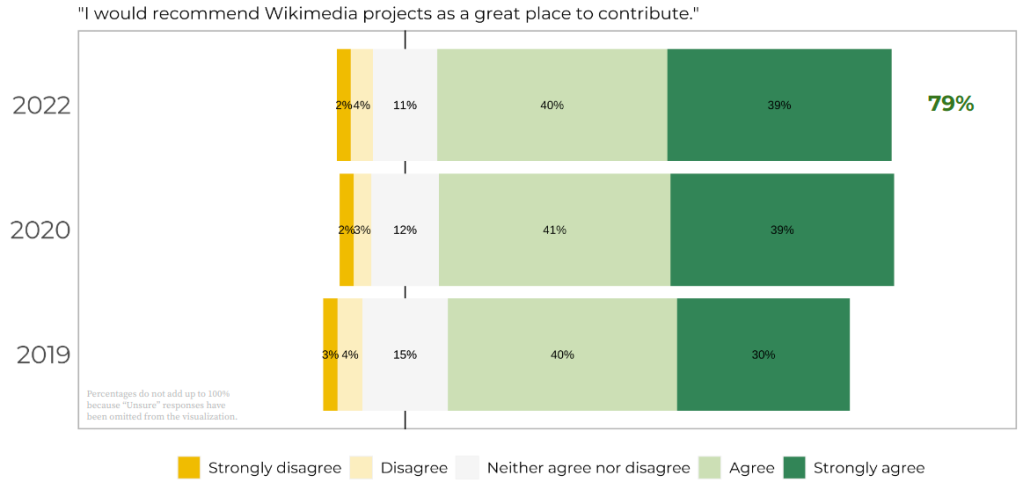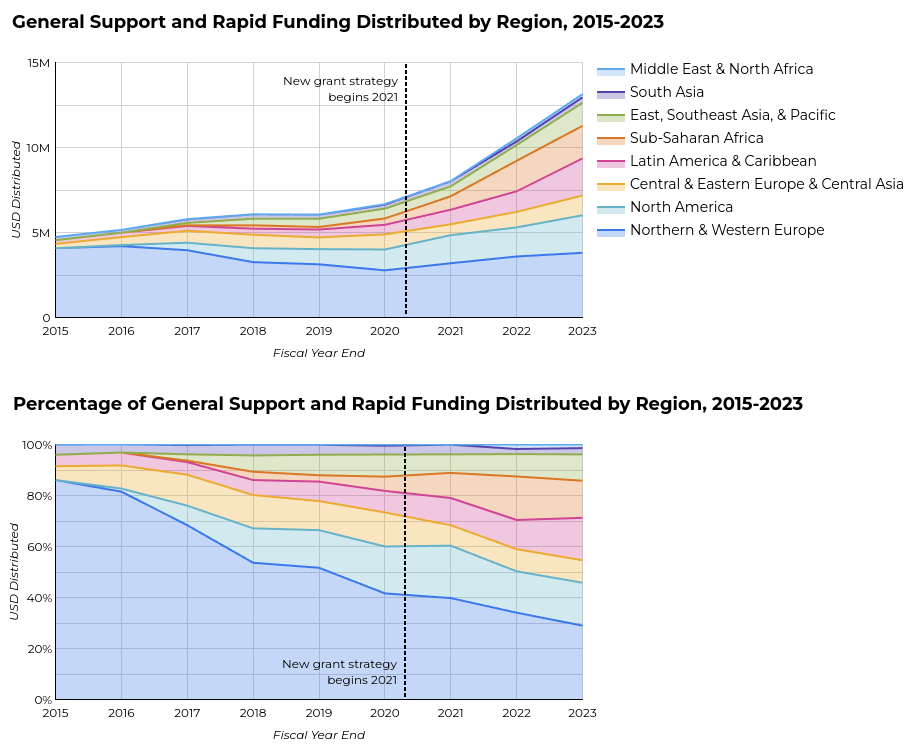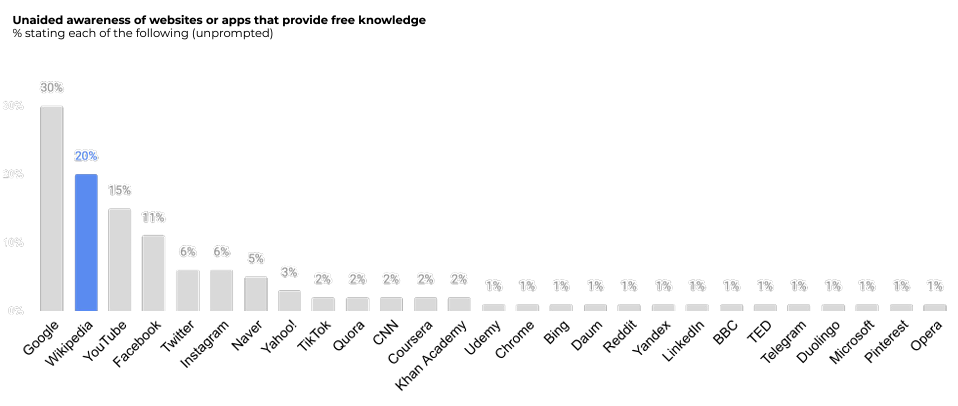
Increase the Sustainability of our Movement is the first of the ten Movement Strategy recommendations. The Wikimedia movement as a whole is responsible for implementing the Movement Strategy 2030, and the Wikimedia Foundation plays an important role. We have prepared a report summarizing strategic data and activities related to this recommendation, focusing on projects led by the Foundation. We encourage others to add work they have done or are aware of. This mapping is an invitation to celebrate strategic achievements and focus on areas needing attention and collaboration to succeed.
This recommendation focuses on people and financial resources. The recommendation calls to invest in the satisfaction and productivity of newcomers and long-term contributors. It also advocates for long-term and equitable approaches to generating and distributing funding. Public awareness, software contributions, and environmentally sensitive practices are also considered essential for the long-term sustainability of Wikimedia.
The report is organized around the eight initiatives that form this recommendation. You can find a sample of the results featured below. You can check the full report on Meta-Wiki.
1. Systematic approach to improve satisfaction and productivity
This initiative calls on the movement to assess contributors’ needs and improve their support and recognition.

According to the Community Insights Survey, between 2019 and 2022, there was a significant improvement in contributors’ satisfaction:
- 9% increase in contributors who would recommend Wikimedia as a great place to contribute (from 70% to 79%)
- 9% increase in contributors who take pride in contributing to Wikimedia projects (77% to 86%)
- 9% increase in contributors who say they feel like they belong in the Wikimedia movement (59% to 68%)
- 5% increase in contributors who report being satisfied with Movement decision-making processes (32% to 37%).
In this report section, you can learn more about activities like WikiCelebrate, Coolest Tool Awards, Wikimedians of the year and many others that recognize volunteers and assess their needs to support them better.
2. Funding for underrepresented communities
This initiative calls on the Wikimedia Foundation to “Dedicate a significantly larger amount of Movement funding to support emerging and marginalized communities and groups.”

Between 2018 and 2022, Wikimedia Foundation -distributed grants to underrepresented regions increased by 300%, from $2,157,981 USD to $6,480,366. As a percentage of the overall grants budget, this proportion grew from 31% to 52% in the same time period. Within Northern & Western Europe and the U.S. and Canada, we have also seen a growth in funding to groups representing marginalized communities.
In this report section, we look at the first results of the revised funding strategy.
3. Increased awareness about the Wikimedia movement
Implementing this initiative requires promoting the Wikimedia movement to readers, volunteers, partners, and donors.

According to the 2022 Wikimedia Brand Health Tracker maintained by the Communications team, global brand awareness for Wikipedia stands at 80%, behind internet giants like Google (93%), Facebook (92%), and Twitter (86%). Relative to other sites or apps, Wikipedia has a good presence in the world (71%), compared to Wikidata (13%) and Wikimedia Commons (11%).
In this report section, we mention some large-scale activities to increase the awareness of our movement.
4. Global revenue-generation policy & fundraising strategy
Implementing this initiative requires the creation of a revenue-generation policy, the diversification of revenue streams, and the development of local fundraising skills.
The drafting and discussion of the Movement Charter, a project supported by the Foundation, are expected to foster a coordinated effort to produce a revenue-generation policy for all Wikimedia entities during 2023.
In this report section, we feature related activities alongside the work of the Movement Charter Drafting Committee.
5. Develop enterprise-level API
This initiative has been implemented. The Foundation launched Wikimedia Enterprise in October 2021, fulfilling the goal of offering an API for commercial reusers with high availability, throughput, and usability standards.
You can check more Wikimedia Enterprise results in the report.
6. Engagement of third-party ecosystems
Implementing this initiative requires collaborating with software development organizations or projects outside of Wikimedia to make our platform more sustainable.
As a recent example, last June, the Language team launched the MinT translation service. This project uses open-source neural machine translation models and supports over 200 languages. MinT’s first version relies on the machine translation models from No Language Left Behind project by Meta, The OPUS (Open Parallel Corpus) project from the University of Helsinki, the IndicTrans2 project by the Madras Institue of Technology, and the Softcatalà Translation project.
In this report section, we feature other open-source collaboration projects and developer outreach programs.
7. Revenue generation for the movement
Implementing this initiative requires exploring new sources of revenue, for instance, through software consultancy services or selling merchandising.
Currently, the Foundation is not planning to offer professional consultancy on MediaWiki, as we do not believe it to be a significant enough source of potential revenue for the Foundation to merit investment. On the other hand, the Wikimedia Foundation has made small investments in the Wikipedia Store, which has increased its revenue from $116,320 USD in FY2020-21 to $134,358 in FY2021-22, and the predicted revenue for FY2022-23 is $147,793.
In this report section, we explain the Foundation’s perspective on this initiative and the opportunity for other Wikimedia players to get involved in its implementation.
8. Align our practices to support environmental sustainability
Implementing this initiative requires all Movement stakeholders to support the sustainability of our planet as we work on our sustainability as a movement.
Since 2018, the Wikimedia Foundation has published an annual Environmental Sustainability Report. According to the last edition, corresponding to 2022, the Wikimedia Foundation’s carbon emissions totaled 2,955 metric tons of CO2-equivalent – less than 1% of other top 10 website platforms like Google and Meta.
This report section offers more data about Wikimedia’s environmental impact and related activities.
***
The summary above offers just a glimpse of the first version of the first report about the first Movement Strategy recommendation’s implementation. We welcome your feedback and contributions to improve and update this report and to inform you about the other recommendations.

Can you help us translate this article?
In order for this article to reach as many people as possible we would like your help. Can you translate this article to get the message out?
Start translation